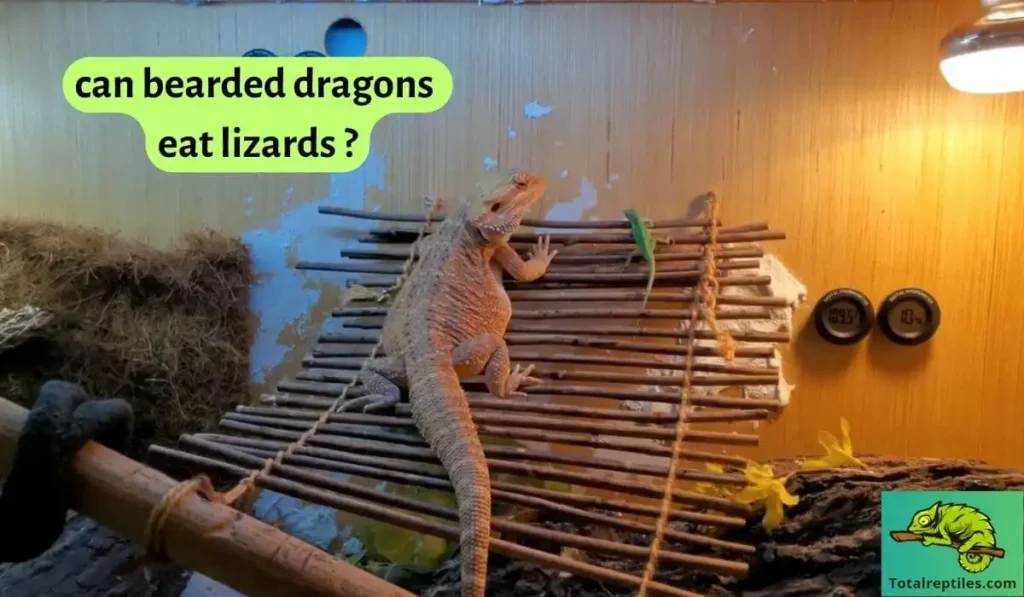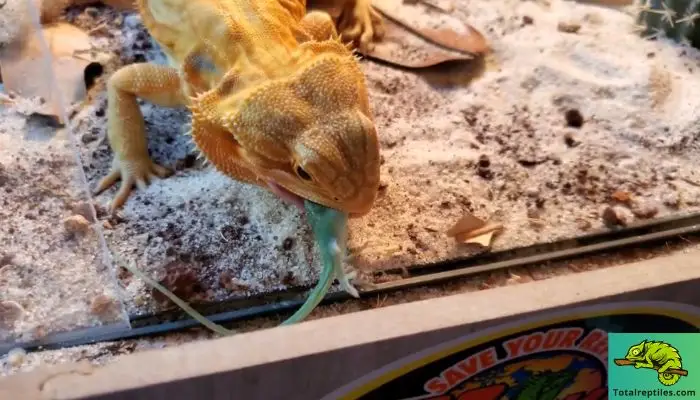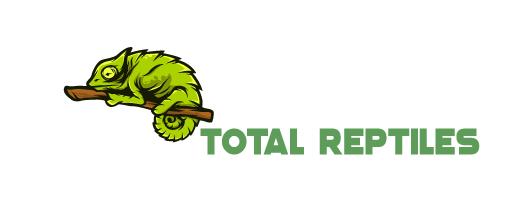Being one of the lizard species itself, it often makes you wonder if beardies can eat their kin. In short, can bearded dragons eat lizards – big or small?
Although they can chow down on mice and lizards, the latter choice may not be suitable for the inland beardies. Wild lizards or lizards caught at home can carry parasites that can be passed on to your reptile friend. Besides, there is the risk of impaction or choking to consider.
If your dragon loves to roam around the house and backyard, you should watch out for what it catches to eat. See whether all lizards are unsafe in the guide below.

Can You Feed Bearded Dragons Lizards?
Your dragon can eat a lizard (small lizards) by accident, but we do not recommend giving it to the pet on purpose.
Bearded dragons are popular for their omnivorous diet, which consists of green and insect matter. The insect portion mainly comprises roaches, crickets, worms, etc., found in the wild.
However, dragons can opt for carnivorous items like fuzzy mice if given a chance or if there are no insects in the region to prey on. It may also be other small animals, such as lizards.
Captive or domesticated beardies have no shortage of food as long as their owners provide it on time. So, there is no need, nor it is recommended to give lizards you find to munch on.
Types of Lizards Bearded Dragons Can Eat
Even if your reptile has an appetite for lizards, which kinds should you aim for?
Always remember that dragons do not naturally hunt for other lizards, but you can offer safer options to diversify the balanced diet with particular treats.
Small Anole
These insect-eating lizards can provide some occasional mental stimulation and enrichment for your beardie, but they are not a significant source of nutrition.
Skinks
A few of the skink species (the blue-tongued skink) have a similar diet to the inland bearded dragons. It means these lizards rely on plant and insect matter as well.
As a result, giving small portions of skink once in a while can add a variety of nutrients to your pet, including calcium and protein.
Small Geckos
Mourning geckos are one of the smaller gecko species that are palatable to the dragon. They offer some essential vitamins and minerals along with protein.
Lastly, make sure these options are bred as feeders and sold at a reputable pet store to prevent disease transmission.
Types of Lizards Bearded Dragons Should Not Eat
Bearded dragons should not consume the following lizard species, as they can be harmful to their health:

Wild-Caught Lizards
These lizards may introduce diseases, parasites, or toxins to your dragon. It is better not to risk its health.
Venomous Lizards
The toxins or venom in certain lizards can harm your reptile extremely. Some notable examples include beaded lizards and Gila monsters. Both are Heloderma species.
Large or Aggressive Lizards
Lizards that are bigger than your dragon or more aggressive can lead to inevitable stress and injuries. You should not offer such animals to your pet. E.g., monitor lizards from Varanus species, tegus from Tupinambis species, etc.
Detecting Poisoning Symptoms in a Bearded Dragon
If you notice these concerning signs in your pet dragon, seek immediate veterinary care:
Excess Lethargy or Weakness
Excessive lethargy and weakness in bearded dragons may be indicative of potential poisoning. The presence of acute inactivity or feebleness beyond common causes like improper diet, housing, or parasites raises concerns about toxic exposure.
Urgent veterinary attention is crucial to assess and mitigate the impact of poisoning on the reptile’s health and well-being.
Loss of Appetite
Loss of appetite in bearded dragons may result from poison exposure.
Toxic products like Pyrethrins, Fenbendazole, Chlorhexidine, and Bleach, as well as certain foods such as onions, mushrooms, and avocados, can cause poisoning, leading to decreased appetite and potential health issues.
List of Toxic Products
- Pyrethrins/Pyrethroids: Overexposure to these sprays can lead to toxicosis in reptiles. If bearded dragons are excessively saturated with these compounds, they may suffer from poisoning. Products that contain this substance are cosmetics, hand soaps, lubricants, pet shampoos, skin treatment drugs, etc.
- Fenbendazole: Overdosing on fenbendazole can be fatal, especially in smaller snake species. Bearded dragons should receive the correct dosage, as excessive amounts can lead to poisoning and potentially result in severe health consequences. Products that contain these substances are different types of vitamin drugs, oral pastes, anti-parasitic products, etc.
- Chlorhexidine: Chlorhexidine is dangerous for bearded dragons when used for bathing. Avoid using it on them as it may cause toxic reactions and threaten their well-being. Products like mouthwash, detergents, surgical disinfectants, and hand gels contain this substance.
- Bleach: Directly applying bleach to bearded dragons can lead to ocular burns and skin irritation. The use of bleach on animals should be avoided at all costs, as it can be harmful and cause poisoning-related symptoms in dragons.
List of Toxic Foods for Bearded Dragons
- Onions and Chives: These foods are highly acidic and contain harmful compounds, making them unsuitable for bearded dragons. Ingesting onions can lead to digestive disturbances and health issues.
- Mushrooms: Due to their high phosphorus and acidic content, mushrooms can be toxic to bearded dragons if consumed.
- Leeks: Part of the onion family, leeks can potentially cause organ failure if eaten in large quantities, making them unsafe for bearded dragons.
- Garlic: Being in the same genus as onions, chives, and leeks, garlic is considered unsafe for bearded dragons.
- Rhubarb: Containing high levels of oxalic acid, rhubarb can be deadly for bearded dragons.
- Avocados: Avocados are toxic to bearded dragons and can hinder calcium absorption, leading to potential health issues.
- Eggplants: The high acidity of eggplants makes them unsuitable for bearded dragons, and overconsumption can be hazardous.
- Iceberg Lettuce: Lacking nutritional value and high in water content, iceberg lettuce can lead to vitamin deficiencies and diarrhea.
- Buttercup: Buttercups are considered toxic to bearded dragons and should not be included in their diet.
- Wild-Caught Insects: Feeding bearded dragons wild insects can expose them to harmful parasites, making them unsafe.
- Fireflies, Box Elder Bugs, and Ladybugs: These insects are poisonous to bearded dragons and can cause harm or death if ingested.
- Caterpillars and Butterflies: Ingesting caterpillars or butterflies that have consumed toxic plants can expose bearded dragons to harmful substances.
- Venomous Insects: Venomous insects like wasps, scorpions, hornets, bees, centipedes, and certain spiders can cause injury or sickness to bearded dragons if ingested.
- Dairy Products: Bearded dragons lack the necessary enzymes to digest dairy products, making them unsafe to consume.
- Acidic Fruits: Fruits with high acidity, like oranges, tomatoes, lemons, and grapefruit, can disrupt the digestive tract and cause problems in bearded dragons.
Owners must be vigilant and cautious when handling these toxic products, ensuring they are kept away from their bearded dragons to maintain their health and safety.
Breathing Difficulty
Breathing difficulty in bearded dragons can be a worrisome sign of potential poisoning.
When reptiles are exposed to toxic substances like smoke, scented products, or overdoses of certain vitamins and drugs, it can lead to respiratory distress.
Toxic compounds like pyrethrins and bleach can cause irritation and damage to the respiratory tract, resulting in labored breathing.
Moreover, chronic overdosing on Vitamin D can lead to calcification of organs, affecting the respiratory system as well.
Immediate veterinary attention is crucial when observing breathing difficulties, as it could be an indication of toxicosis, and prompt intervention is necessary to prevent further harm to the bearded dragon’s health.
Frequently Asked Questions
- Can bearded dragons eat small lizards?
Yes, but it should not be a regular meal, as they can pose risks of gut impact or choking. Small lizards should be an infrequent snack, though it is best to avoid them if possible.
- Can bearded dragons eat other lizards?
Bearded dragons can eat certain lizard types only in moderation. It can be a small anole, gecko, or skink, so long as they are not hostile. Never feed poisonous, wild-caught, or larger lizards to your beardie. They can stress or injure your pet badly. Try to stick to a properly balanced diet of fruits, vegetables, and insects.
- Can bearded dragons eat snakes?
A snake is not part of a dragon’s natural diet. Therefore, you should not offer a snake or a portion of a snake to it. Snakes can carry various diseases and parasites and may cause potential injuries to the pet while defending themselves.
Conclusion
So, can bearded dragons eat lizards? It relies on several factors like feeding conditions, habitat, appetite change, etc. But the owner should not provide lizards, big or small, to his/her pet, even if they are from a reputable pet store.
Try to indulge your dragon in consuming its regular diet, which involves assorted greens and gut-loaded insects.
Finally, never leave a wild-caught or aggressive lizard in the dragon’s tank unsupervised. Remember, both kinds are territorial.
References
- Stahl, Scott J. “General husbandry and captive propagation of bearded dragons, Pogona vitticeps.” Bulletin of the Association of Reptilian and Amphibian Veterinarians 9.4 (1999)
- Raiti, Paul. “Husbandry, diseases, and veterinary care of the bearded dragon (Pogona vitticeps).” Journal of Herpetological Medicine and Surgery 22.3-4 (2012)

